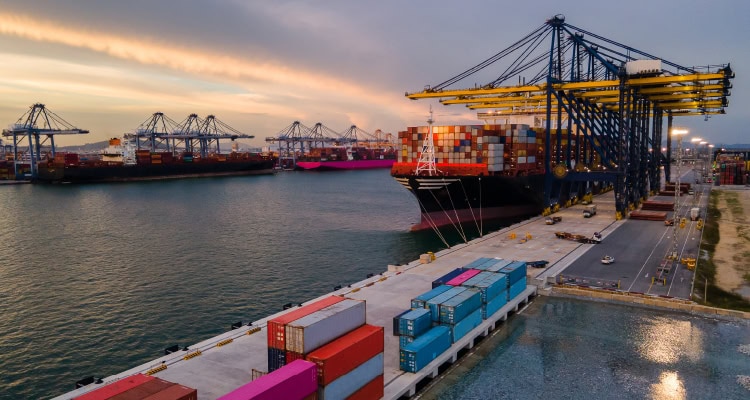State of Logistics Report; The Latest Data on Cross-Border Trade; Spotlight on Autonomous Supply Chains & other Logistics News

News, trends, and insights on the latest in global logistics and supply chain management.
2025 State of Logistics Report: A Foggy Forecast
The logistics and supply chain sector continues to chart a course through economic turbulence, geopolitical pressures, and shifting trade landscapes, according to the newly released 2025 State of Logistics Report by CSCMP, authored by Kearney and presented by Penske Logistics. Themed “Navigating Through the Fog,” this year’s report paints a picture of a sector in flux.
Logistics costs in the United States rose to $2.58 trillion, holding steady at 8.8% of GDP, even amid flat business volumes and surplus truck capacity, the report finds. The data signals a return to some pre-pandemic patterns, but with persistent headwinds such as operational cost inflation, ongoing labor shortages, and global trade volatility.
Mexico overtook China as the United States’ top trading partner in 2024 (with $840 billion in trade), highlighting a broader reshoring and nearshoring trend, accelerated by tariff instability and the need for more reliable supply networks. Meanwhile, ecommerce’s continued boom—global online sales hit nearly $6.3 trillion in 2024—is reshaping last-mile delivery expectations and warehousing agility.
A clear message from the report: Resilience is no longer optional. With AI, automation, and data analytics becoming more accessible, companies that act now to integrate long-term durability into their networks and decision-making will have a better chance of cutting through the fog.
The report also includes breakdowns by mode, with the following highlights:
 3PLs: Growing in importance as shippers face a heady array of challenges, third-party logistics providers are under pressure this year to evolve rapidly and expand their scope of services. They are also being called on to integrate advanced technologies to deliver greater flexibility, visibility, and resilience. 3PLs will invest more in regional hubs and last-mile delivery networks in 2025, the report predicts.
3PLs: Growing in importance as shippers face a heady array of challenges, third-party logistics providers are under pressure this year to evolve rapidly and expand their scope of services. They are also being called on to integrate advanced technologies to deliver greater flexibility, visibility, and resilience. 3PLs will invest more in regional hubs and last-mile delivery networks in 2025, the report predicts.
 Air: In 2024, the airfreight market experienced a banner year, driven by record-breaking demand and notable capacity expansion, which was propelled by booming ecommerce from platforms such as Temu and Shein. The report predicts slower growth for 2025—5.8% versus 2024’s 8.6%—with projected volumes reaching 80 million tons.
Air: In 2024, the airfreight market experienced a banner year, driven by record-breaking demand and notable capacity expansion, which was propelled by booming ecommerce from platforms such as Temu and Shein. The report predicts slower growth for 2025—5.8% versus 2024’s 8.6%—with projected volumes reaching 80 million tons.
 Ocean: A 4.5% global demand increase featuring shipment frontloading, regional disruptions, and supply chain bottlenecks kept rates high in 2024 despite carrier fleet expansion. For 2025, demand growth is expected to slow to 3%, while supply, driven by new vessel deliveries, will outpace demand, leading to reduced rates and increased competition.
Ocean: A 4.5% global demand increase featuring shipment frontloading, regional disruptions, and supply chain bottlenecks kept rates high in 2024 despite carrier fleet expansion. For 2025, demand growth is expected to slow to 3%, while supply, driven by new vessel deliveries, will outpace demand, leading to reduced rates and increased competition.
 Trucking: After a stabilizing year in 2024, the motor freight sector now faces an outlook clouded by escalating global geopolitical tensions. Carriers face new financial pressures from tariffs, potentially declining freight volumes, higher duties on commercial vehicles, and possible increased equipment costs.
Trucking: After a stabilizing year in 2024, the motor freight sector now faces an outlook clouded by escalating global geopolitical tensions. Carriers face new financial pressures from tariffs, potentially declining freight volumes, higher duties on commercial vehicles, and possible increased equipment costs.
 Rail: Class I railroads reported modest revenue growth and a stronger increase in operating income in 2024. This is leading them in 2025 to invest in infrastructure and strategic partnerships to support long-term growth and attempt to convert a share of the $50 billion long-haul truck freight market to rail.
Rail: Class I railroads reported modest revenue growth and a stronger increase in operating income in 2024. This is leading them in 2025 to invest in infrastructure and strategic partnerships to support long-term growth and attempt to convert a share of the $50 billion long-haul truck freight market to rail.
Cross-Border Trade 2025: Glass Half Full or Half Empty?
 Ongoing geopolitical tensions, regulatory shifts, and rising costs continue to challenge global shippers. Two new reports—Asendia’s Beyond Borders and Redwood Logistics’ Q2 Cross Border Index—highlight a trade landscape marked by both opportunity and disruption.
Ongoing geopolitical tensions, regulatory shifts, and rising costs continue to challenge global shippers. Two new reports—Asendia’s Beyond Borders and Redwood Logistics’ Q2 Cross Border Index—highlight a trade landscape marked by both opportunity and disruption.
Half Full: Growth Amid Complexity
Retailers aren’t backing down from global ambitions. Asendia finds 72% of global retailers expect international ecommerce sales to grow in 2025. Strategic shifts reflect this optimism:
- 35% of global retailers are investing in faster shipping and automation to stay competitive.
- 33% have adopted “returnless returns” to cut costs and emissions.
- Regional expansion is rising—U.S. brands eye Canada (47%) and South America (24%), while Chinese brands focus on East Asia (42%) and the Middle East (38%).
In addition, Redwood’s data shows U.S.-Mexico trade up 4% YoY in April 2025, hitting $73.77 billion. Businesses are mitigating risk with inventory stockpiles, supplier diversification, and trade zone usage, the report notes.
Half Empty: Mounting Headwinds
Nearly half of retailers report negative tariff impacts; high shipping costs and customs delays are also major issues. Political instability, especially in Europe, adds further risk.
Redwood’s report warns of new disruptions: a U.S. order requiring English proficiency for Mexican truck drivers could worsen labor shortages and border delays. Plus, tariff policy volatility adds further complexity to already fragile supply chains.
Bottom line: Cross-border trade is still moving—but navigating it now requires more agility than ever.
Ports Hit a Crossroads

Global ocean shipping faces a paradox: while some ports show signs of efficiency gains, others remain major chokepoints, reveals Beacon’s latest Port Performance and Operations Report.
Overall port performance shows improvement, with shorter anchor waiting times and faster container movement. Notably, the Port of Savannah saw a 43% drop in anchorage waiting time, marking a major turnaround. Certain regions, however, still face operational setbacks. Chittagong (Bangladesh) emerged as the most congested port, with ships waiting nearly 69 hours.
Other key regional findings include:
Oceania leads with the most efficient port performance overall.
Sub-Saharan Africa improved significantly, yet continues to struggle with the longest berth turnaround (2.5 days) and highest container dwell time (161 hours).
Shanghai topped ship counts at anchorage (62), while Hong Kong saw an 88% drop.
Several ports—including Barcelona, Oakland, and Busan—reported zero anchorage wait, signaling strong operational health.
Djibouti, Seattle/Tacoma, and King Abdullah stood out for their resilience and efficiency across multiple performance metrics.

Autonomous Supply Chains Gain Favor
Traditional supply chain agility and efficiency strategies need a revamp in order to keep up with pressures from disruptions such as growing online demand, a changing trade environment, and workforce shortages. An increasing number of companies now view tech-powered, AI-led autonomous supply chains as the potential fix.
That’s the key takeaway from Accenture’s new survey, Making Autonomous Supply Chains Real, a poll of 1,000 C-suite executives across 10 industries. Findings indicate that while supply chain autonomy hasn’t been a key focus and is not yet highly adopted, it is quickly gaining favor.
AI-led autonomous supply chains can enable organizations to predict and respond to disruptions faster, balance supply and demand dynamically, and free up human talent for innovation instead of addressing problems, the report notes.
Here’s what the research shows:
- Today, the average autonomy level remains low—only 21% on a 0–100% scale. Most companies still rely heavily on manual interventions; few use AI to adjust sourcing, reroute logistics, or rebalance inventory in real time.
- 66% of companies currently plan to increase supply chain autonomy in the next decade, and about 40% aim to reach higher autonomy levels where systems handle most operational decisions.
- Before the most recent tariff developments, only 25% of companies saw autonomous supply chains as a strategic priority.
The report also details a three-step roadmap toward autonomous supply chains:
1. Build a solid, secure data foundation. This involves integrating real-time data from various parts of the supply chain into a single accessible platform.
2. Invest in critical, AI-enabling technologies, then scale strategically. Companies should focus on investments that improve agility and efficiency—for instance, upgrading legacy systems and building an adaptable AI stack.
3. Restructure how people and technology work together. Preparing the workforce for change and boosting employee engagement is imperative for building an autonomous supply chain.
Brands Bulk Up on Inventory

In a high-stakes game of inventory management roulette, companies across the United States are loading up their shelves as they scramble to keep up with and/or outrun the Trump administration’s tariff policies. Inventory levels increased a staggering 228% in just two months, shows new data from unified commerce solutions provider Deposco. The analysis shows this Days of Inventory on Hand (DIOH) increase was based on actual WMS system transaction data rather than forecasts, underscoring the validity of the increase.
The current inventory surge represents only the first phase of a two-part market reaction to trade tariffs, Deposco’s analysis suggests. The initial pre-buying surge is likely to be followed by a period of margin compression as carrying costs eat into profits, potentially forcing businesses to discount heavily to move excess inventory later in 2025.
Here’s how the scenario is playing out:
Warehousing capacity crunch: Brands and consumer packaged goods companies are rapidly filling available warehousing space to beat tariff deadlines, creating a nationwide capacity challenge.
Profitability paradox: Logistics providers face reduced revenue potential as warehouse space fills with static inventory rather than flowing through for fulfillment, where margins are highest.
Industry-specific impacts: The data reveals significant variations in inventory strategy by sector, with consumer electronics, apparel, and home goods seeing the most aggressive stockpiling behaviors.
Inventory carrying cost explosion: Detailed analysis shows how storage costs, insurance, and financing expenses are dramatically increasing as a percentage of product value across nearly all categories.
Supply Chain Careers Deliver

Pat yourself on the back for choosing a career in supply chain—it’s widely viewed as a great field in which to work. That’s the overall sentiment of employees in the sector, according to The 2025 ASCM Supply Chain Salary and Career Report, based on responses from more than 3,500 supply chain professionals. The research reveals that the supply chain sector continues to provide stable career paths, strong earning potential, and high job satisfaction.
Here’s a breakdown of key wins:
Competitive compensation: The median U.S. supply chain compensation has reached six figures for the second year in a row ($103,000), including bonuses, which is 52% higher than the national median.
Strong job market: One-third of U.S. supply chain professionals are optimistic about their career prospects, indicating a robust job market.
Job mobility and advancement: Younger professionals experienced a significant number of job changes and promotions in 2024, demonstrating a dynamic career landscape.
Clear career progression: The report shows a straightforward path for career advancement, with directors earning substantially more than managers and entry-level professionals.
Positive work environment: Globally, 62% of supply chain professionals report a positive company culture, and 78% have flexible work arrangements.
High job satisfaction: 82% of respondents enjoy high levels of job satisfaction (ranking it at least 7 out of 10), and 83% would recommend a supply chain career.
The report also shows the correlation between advanced education and increased salaries, with professionals who obtain graduate or masters degrees receiving a median salary of $119,000. In addition, survey respondents shared their ideas on what emotional skills it takes to succeed in the field, ranking trouble shooting, collaboration, and critical thinking as the most important.
